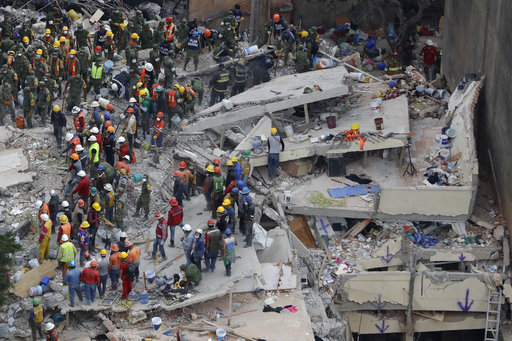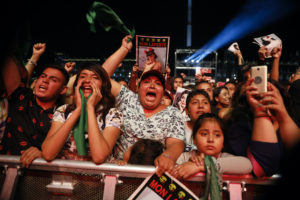‘Esto es México’: Mexicans Rise From Rubble of Violence, Quakes
"This is Mexico": In a week when they protested, celebrated, mourned and above all came together, Mexicans show that hope dies last. People across Mexico City are digging through collapsed buildings, trying to save victims trapped in the rubble of schools, homes and businesses toppled by this week's magnitude 7.1 earthquake. (Rebecca Blackwell / AP)
People across Mexico City are digging through collapsed buildings, trying to save victims trapped in the rubble of schools, homes and businesses toppled by this week's magnitude 7.1 earthquake. (Rebecca Blackwell / AP)
What a week to be Mexican—seven days filled with pain, shame and pride for many reasons. Though I grew up in Mexico City, it’s been quite a while since I have been back to visit that great urban sprawl, but two memories often come to mind at the same time when I remember my life there.
As a child of 11, I watched a young woman being chased down the avenue that our sixth-floor apartment overlooked in the Polanco neighborhood. A man had been stripping her of her clothing until she reached the corner in front of our window and I saw her run to a policeman, who immediately enveloped her in his coat.
The other memory is of a mass protest in 2004, which my parents would not let me attend because I was underage, when thousands of people from all parts of the still very unequal society converged on Reforma, the main avenue in the capital, to protest violence. I watched the crowds of people dressed in white on our television screen, coming together to show that our nation was capable of unity and hope, even in the face of extreme violence and kidnappings.
In recent years, news of violence against women has continued to emerge from Mexico, the country I still call home. Stories of femicide in Ciudad Juarez are well documented, but the violence isn’t limited to this border town. In 2015, it was reported that six women were killed each day in Mexico, prompting Ana Güezmes, a representative of United Nations Women, to say, “Femicides are a pandemic in Mexico.”
As the Latin American nation celebrated its independence from Spain last weekend, not much seems to have changed. On my Facebook feed, where I am in touch with family and friends living in various parts of Mexico, I saw many of them post they were refusing to celebrate a nation where women continue to face extreme violence. They were referring to 19-year-old Mara Fernanda Castilla, who had recently disappeared in Puebla after using a taxi-hailing app. She was found dead Saturday, 107 years to the day that Mexico’s famous “Grito de Dolores” was first given. And three days earlier, the mutilated bodies of a woman and two men in sombreros were found in Xalapa.
The country gathered in pain and shame, rather than pride, once again. On Monday, protesters marched in cities across Mexico with signs reading “Ni una menos,” which translates as “Not Even One Less,” a phrase that has become the battle cry of those fighting femicide all over Latin America. Tania Reneaum, executive director of Amnesty International Mexico, told Al-Jazeera that day, “Sexual violence against women is constant, and it happens on a daily basis in Mexico. … We marched not only for Mara but for so many women who have been killed.”
Tuesday, just a day after the marches, an earthquake of magnitude 7.1 hit central Mexico. Buildings all over the region collapsed, leaving at least 245 people dead and thousands injured as of Thursday morning as efforts to rescue people from the rubble continue.
The response across the country has been overwhelming. My social media feeds have been bombarded with notes about Mexico, about how each person, near and far, could help those in need. One former classmate of mine wrote that as he stood outside his apartment building, which was probably no longer habitable, he was filled with hope and pride as his compatriots gathered around to offer support. “This is Mexico,” he concluded.
That phrase, “Esto es México,” has spread across the internet as people tell stories of brave volunteers and as clips, such as the one below, show people coming together and singing as they mourn and organize.
“Hope dies last,” rescue volunteer Edgar Sanchez told media as he wearily explained that he would continue to help however he could.
Hope: a word it seems no one who has seen what Mexico is capable of has forgotten, even in the darkest times.
Your support matters…Independent journalism is under threat and overshadowed by heavily funded mainstream media.
You can help level the playing field. Become a member.
Your tax-deductible contribution keeps us digging beneath the headlines to give you thought-provoking, investigative reporting and analysis that unearths what's really happening- without compromise.
Give today to support our courageous, independent journalists.









You need to be a supporter to comment.
There are currently no responses to this article.
Be the first to respond.